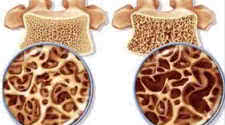How the Consumption of Protein affects Calcium Absorption & Our Bones

One Must Understand Full what One Consumes for Optimal Results
The issue of calcium absorption and protein intake has been ongoing since bodybuilders first realized that high-protein diets encourage muscle building.
Today, we have a better understanding of how protein - and the phosphorus that comes along with it - affects the absorption of dietary calcium. Several
studies show that when dietary protein intake increases, urinary calcium excretion rises. Coincidentally, diets high in protein also tend to be high in
phosphorus, which tends to increase fecal calcium losses and decrease urinary protein losses. Most bodybuilders are slaves to high-protein diets, and
that begs the question of whether or not protein or phosphorus intake has a negative impact on calcium absorption.
A past comprehensive review of data on calcium balance related to protein and phosphorus intake (R.P. Heaney, "Dietary protein and phosphorus do not
affect calcium absorption," American Journal of Clinical Nutrition, 72[3]:758-61, 2000) addressed this issue. This meta-analysis of studies of 191 women,
who were each tested a few times over a 32-year period, sought to determine whether or not protein and phosphorus intake affects calcium absorption over
time. The focus of the research was women, since they are traditionally more at risk for bone problems later in life due to the loss of estrogen or lack
of estrogen replacement. The investigation included both estrogen-replete and estrogen-deprived women ranging in age from 40 to 60. During the period
covered by the testing, the women ate a daily diet that included approximately .75 to 1.3 grams of protein per kilogram of bodyweight. This is not a lot
of protein by bodybuilding standards, but it is important to remember that the analysis was designed to determine whether protein or phosphorus had a
direct effect on calcium absorption at any intake level. The various studies used a sophisticated double-tracer technique in order to determine calcium
balance, which would show whether or not protein and phosphorus affected calcium absorption no matter the protein intake. The large number of studies that
were evaluated also made it possible to detect small differences in total calcium balance.
The results showed that neither protein nor phosphorus could be linked to a lower level of calcium absorption. It was clear that, as protein and phosphorus
intake increased, total calcium intake, age, hormonal status and serum vitamin D concentration were of greater importance than the effect that either
nutrient had on uptake.
The bottom line is that if you are a bodybuilder who consumes high amounts of protein and phosphorus, make sure you are getting plenty of calcium and vitamin
D - in other words, drink milk or take a calcium supplement. As for vitamin D, Californians and Fioridians have a year-round advantage since sunlight helps
the body produce its own vitamin D; people living in "darker" states should consume dairy products fortified with vitamin D, or they should take calcium and
vitamin D supplements. As we at fitFLEX have said before, following a bodybuilding lifestyle builds more than strong muscles: It also improves the strength of
your skeleton. Science is telling us that protein is not the bone enemy it is rumored to be.